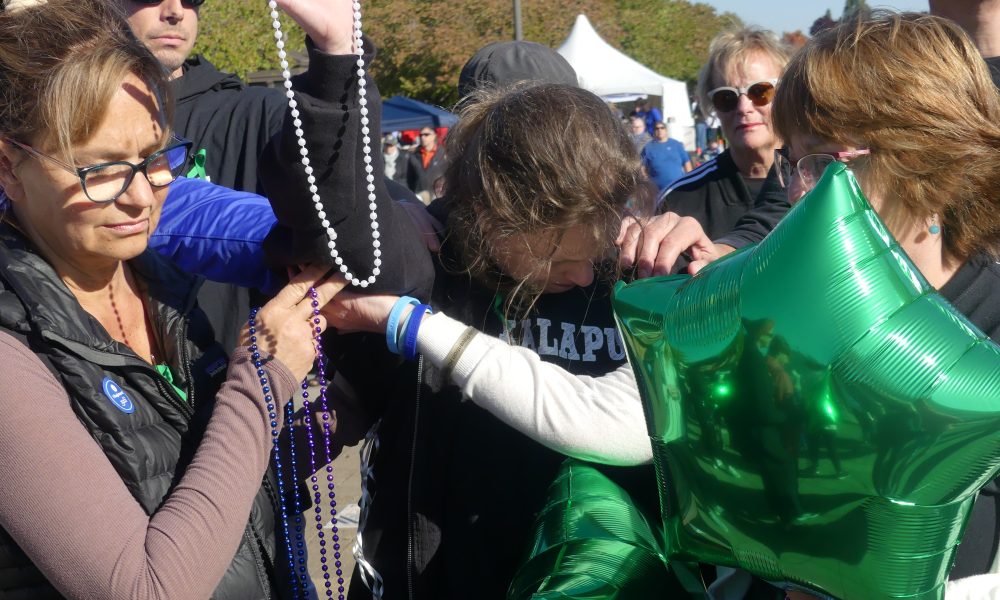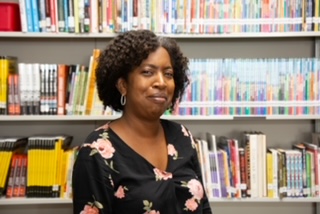
DeLee Brown, center, mourns the death of her son, Aaron, at Salem’s Out of the Darkness suicide prevention walk on Oct. 13, 2018. (Rachel Alexander/Salem Reporter)
Supported by friends and colleagues, DeLee Brown held up a string of glimmering white beads as tears streamed down her face.
In a crowd of thousands gathered at the Capitol Mall Saturday morning for a suicide prevention walk, Brown was among those wearing white to symbolize the loss of a child to suicide.
Her son, Sprague High School junior Aaron Brown, took his own life last week.
“Hug your kids. Keep fighting. Don’t give up,” she said.
In a circle around Brown were more than a dozen staff and friends from Kalapuya Elementary School, where she teaches music, and Sprague, where her husband teaches choir.
They wore purple beads, symbolizing the loss of a friend or relative, and buttons reading, “Don’t let your song end. Someone needs to hear it.”
Kalapuya Principal Jennifer Neitzel said those buttons, which show a heart formed out of a treble and bass clef, were made at Brown’s request.

R.A. Neitzel displays a button made following the suicide of Sprague junior Aaron Brown. (Rachel Alexander/Salem Reporter)
Brown said she’s not yet ready to talk about Aaron’s life and his loss. His funeral was held Thursday, one week after his death. She and her husband are working to set up a choir scholarship in Aaron’s name.
The Salem-Keizer School District has provided grief counselors at Sprague and Kalapuya and had extra substitutes on hand for staff who needed to take time off to grieve, district spokeswoman Lillian Govus said.
As the community has cried together and shared memories, many have also wondered: What can we do to make sure this doesn’t happen again?
“As a parent you always feel guilt. I wish it could be more talked about,” said Michelle McAllister-van Kempen, a Sprague graduate and parent of two sophomores.
McAllister-van Kempen posted a video her son took at a prayer circle for Sprague last weekend which has since received more than 116,000 views on Facebook.
She said the healing power of the circle was clear, but she’d like to do more to help prevent youth suicide.
“Everybody wants to help. We just don’t know what to do,” she said.
Brown’s death is the second student suicide at Sprague so far this year, and the third of 2018, said Phil Blea, who supervises youth and family crisis services at the Marion County Health Department.
The county is working with the district and state on a long-term plan that will likely include suicide prevention training for interested parents and students, as well as ongoing support for people struggling after Brown’s death, Blea said.
The Oregon Health Authority is also sending a rapid response suicide prevention team to Sprague, said Ann Kirkwood, the state’s youth suicide intervention coordinator.
It’s a new service provided under contract with Lines for Life, Oregon’s suicide prevention hotline, to help a community heal while preventing more suicides.
Kirkwood said suicide contagion – a phenomenon where one well-known suicide may spark others – is more common for young people, who usually have less life experience with grief and loss to help them through the death of a friend.
“It’s always a concern that when we respond to a suicide of youth. We keep that in the back of our mind and reach out to other youth that are hurting,” she said.

DeLee Brown, right, gets a hug from a friend during Salem’s Out of the Darkness suicide prevention walk. (Rachel Alexander/Salem Reporter)
Youth suicide prevention has some unique challenges, experts say. Teens going through puberty are in a state of flux, and moodiness, changes in behavior and other shifts are not uncommon. Withdrawal is one warning sign before someone attempts suicide, but for parents used to single-word answers from their teens, it can be hard to tell when something more serious is going on.
But those challenges aren’t insurmountable.
Asking “are you okay?” is a good first step, but few teens will say “No” the first time they’re asked, said Doug Gouge, who works on youth suicide prevention for Polk County.
“Compassionate persistence is a really good thing to use with teens,” he said.
If your gut tells you your child is struggling, it’s okay to keep asking, while making it clear you’re there to help, not judge. Asking someone directly if they’re thinking about suicide is okay.
“They might share a little bit and see how you react and then share a little bit more,” Gouge said.
Knowing your children well is also important, said Emily Moser, who run’s Oregon’s YouthLine, “so you’re capable of recognizing what … an unusual change in behavior would be.”
One of her teenage sons keeps his room messy, for instance. If his room were suddenly spotless without Moser asking him to tidy up, that might be a sign something is off.
Withdrawing from parents is normal, but teens struggling with suicidal thoughts will often withdraw from hobbies, friends or other things as well.

Thousands of people gathered in front of the Oregon Capitol Building to remember loved ones lost to suicide on Oct. 13, 2018. (Rachel Alexander/Salem Reporter)
Blea said young people may also be reluctant to be open with adults because they assume, often correctly, that their parents will panic if they mention suicide.
While thinking about suicide is never good, Blea said a child who’s willing to discuss suicidal thoughts openly is less likely to actually attempt suicide than someone who’s struggling with those thoughts and won’t talk openly about them.
He said he’d like to see more parents learn the warning signs so the community has “parents feeling comfortable having those conversations.”
How can concerned parents make a difference?
Making it clear that you’re a safe, nonjudgmental person to talk to is key, Blea and Gouge said.
Gouge said it’s not uncommon for people to try to reason with loved ones who are suicidal, or urge them to consider that suicide is selfish or will leave others hurting. But those comments aren’t helpful, and often leave people feeling more judged than supported.
“People who are thinking about suicide are going through something that you have no reference point for,” he said.
Oregon has a YouthLine where teens can get help from other teenagers trained to respond to crises, available at (877) 968-8491, or by text at 839863.
Many local groups offer free, two-hour trainings on suicide prevention called QPR – question, persuade and refer. The county is working to offer more classes in the wake of suicides at Sprague. Blea said they would be a good next step for parents who want to get more involved in prevention.
Interested community members can contact the Mid-Valley Suicide Prevention Coalition, or Blea at [email protected] or (503) 361-2733 to organize a training.
“It’d be great if Salem took this on as ‘Not in our city,’” he said.
Heather Hemmert, a Sprague parent whose son, Colby, was good friends with Aaron, said the Brown family has been open with their community, welcoming her son and other families into their home to share memories.
“I think the most healing has come from the Brown family themselves, where they have been openly talking about how to recognize mental illness, how to recognize depression,” she said. “I don’t know how they have the strength to do that.”
Hemmert said she and Colby will miss Aaron’s sense of humor. He was always making goofy faces, smiling and finding ways to support his friends, she said.
“This choice, this one choice doesn’t take away that he was an amazing friend, doesn’t take away that he was an amazing boy,” she said.
Getting help
YouthLine gives Oregon teens an option to talk to other trained teenagers, via call or text, from 4-10 p.m. weekdays, with calls answered by adults during other hours. YouthLine is available at (877) 968-8491, or by text at 839863.
Warning signs for suicide include withdrawal, isolation and talking about being in unbearable pain or being a burden to others. The American Foundation for Suicide Prevention has a list of risk factors, warning signs and suggestions for helping someone who may be thinking about suicide.
The National Suicide Prevention Lifeline is available 24 hours a day at 1-800-273-TALK(8255), and connects callers with a crisis center near them. For help in Spanish, call 1-888-628-9454.
Reporter Rachel Alexander: [email protected] or 503-575-1241.

Rachel Alexander is Salem Reporter’s managing editor. She joined Salem Reporter when it was founded in 2018 and covers city news, education, nonprofits and a little bit of everything else. She’s been a journalist in Oregon and Washington for a decade. Outside of work, she’s a skater and board member with Salem’s Cherry City Roller Derby and can often be found with her nose buried in a book.










